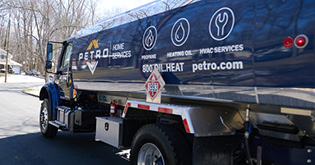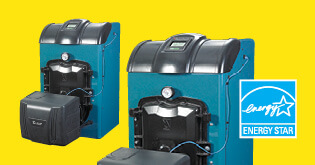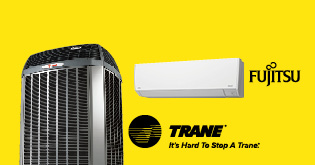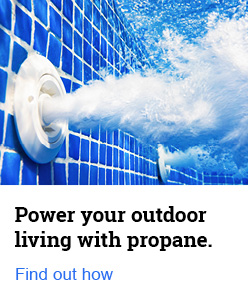- My Account:
- Sign In
- Register
- Make Payment
Articles and News
Learn about HVAC and home comfort topics, get expert tips and advice from your local HVAC pros and see what Petro has been up to in the community.
Featured Posts
Hot water not working? Try these water heater troubleshooting tips.
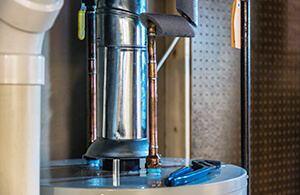
If there’s one thing nobody enjoys, it’s being treated to a surprise cold shower in the middle of winter. If you’ve suddenly found yourself without hot water, then you probably want a solution to your water heater not working— and fast.
While calling a certified hot water heater repair service is the only way to properly diagnose and treat hot water heater problems, there are a number of things you can try while you wait for a professional to arrive. But first, you will need to determine which type of hot water heater you have (natural gas and electric are the two main types of water heater, accounting for about 80% of all models in use).
Understanding the differences between natural gas and electric water heaters.
To figure out whether your water heater is natural gas or electric, look for a power supply cable that runs to your water heater and or a label for your water heater in your breaker box. If you see either of these it’s likely you have an electric water heater. If you can’t locate any of these features, wait until a professional repairman arrives; you might have an unusual model of water heater that requires specific expertise.
Note that if you end up having to replace your hot water heater, you may want to consider choosing a natural gas model. While these water heaters may cost more upfront, in many ways they are much less expensive to run month to month, as they are more energy-efficient.
General symptoms: Troubleshooting common hot water heater problems.
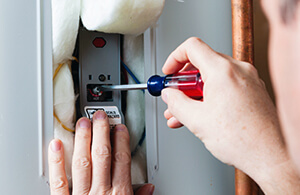
- If your water is too hot or too cold but is still being heated to some degree this could indicate an issue with your thermostat. We recommend you call a repairman as you may need to have the vents around your unit cleaned.
- If you frequently have an inadequate supply of hot water, then your hot water tank is probably too small to meet the demands of your household. If this is the case, consider upgrading to a larger model. However, if your model should be able to meet your needs, then the problem may be a faulty heating element (if your model is electric).
- If your water heater is leaking, shut off both the water supply and electrical supply to your unit and call a repairman as soon as possible.
- If you notice that the water coming out of your taps is yellow or rust-colored, then the inside of your hot water tank is probably corroded. You may also have corroded pipes. If this is the case, either your unit or the pipes around it will have to be replaced.
- If the water coming out of your taps has a bad odor to it, you may have a bacterial infestation in your tank. You will need to have your tank cleaned and repaired.
- If your hot water heater seems noisier than it should be, the problem is probably a buildup of sediment on the bottom of the unit. Getting your tank cleaned should correct this issue.
In conclusion, a word of caution.
While some common hot water heater problems—like a tripped circuit breaker —are easy to address, most hot water heater repairs need professional attention. It’s extremely important to remember that both natural gas and electricity are highly dangerous. Natural gas leaks can cause explosions, and electricity—especially when water is involved—can easily lead to electric shocks. If you’re not sure what’s wrong with your hot water heater, call the experts at Petro Home Services.
Related links
- Tankless vs. tank storage water heaters
- When is it time to replace your water heater?
- Tank And Tankless Hot Water Heaters
HVAC
See AllHot water not working? Try these water heater troubleshooting tips.

If there’s one thing nobody enjoys, it’s being treated to a surprise cold shower in the middle of winter. If you’ve suddenly found yourself without hot water, then you probably want a solution to your water heater not working— and fast.
While calling a certified hot water heater repair service is the only way to properly diagnose and treat hot water heater problems, there are a number of things you can try while you wait for a professional to arrive. But first, you will need to determine which type of hot water heater you have (natural gas and electric are the two main types of water heater, accounting for about 80% of all models in use).
Understanding the differences between natural gas and electric water heaters.
To figure out whether your water heater is natural gas or electric, look for a power supply cable that runs to your water heater and or a label for your water heater in your breaker box. If you see either of these it’s likely you have an electric water heater. If you can’t locate any of these features, wait until a professional repairman arrives; you might have an unusual model of water heater that requires specific expertise.
Note that if you end up having to replace your hot water heater, you may want to consider choosing a natural gas model. While these water heaters may cost more upfront, in many ways they are much less expensive to run month to month, as they are more energy-efficient.
General symptoms: Troubleshooting common hot water heater problems.

- If your water is too hot or too cold but is still being heated to some degree this could indicate an issue with your thermostat. We recommend you call a repairman as you may need to have the vents around your unit cleaned.
- If you frequently have an inadequate supply of hot water, then your hot water tank is probably too small to meet the demands of your household. If this is the case, consider upgrading to a larger model. However, if your model should be able to meet your needs, then the problem may be a faulty heating element (if your model is electric).
- If your water heater is leaking, shut off both the water supply and electrical supply to your unit and call a repairman as soon as possible.
- If you notice that the water coming out of your taps is yellow or rust-colored, then the inside of your hot water tank is probably corroded. You may also have corroded pipes. If this is the case, either your unit or the pipes around it will have to be replaced.
- If the water coming out of your taps has a bad odor to it, you may have a bacterial infestation in your tank. You will need to have your tank cleaned and repaired.
- If your hot water heater seems noisier than it should be, the problem is probably a buildup of sediment on the bottom of the unit. Getting your tank cleaned should correct this issue.
In conclusion, a word of caution.
While some common hot water heater problems—like a tripped circuit breaker —are easy to address, most hot water heater repairs need professional attention. It’s extremely important to remember that both natural gas and electricity are highly dangerous. Natural gas leaks can cause explosions, and electricity—especially when water is involved—can easily lead to electric shocks. If you’re not sure what’s wrong with your hot water heater, call the experts at Petro Home Services.
Related links
- Tankless vs. tank storage water heaters
- When is it time to replace your water heater?
- Tank And Tankless Hot Water Heaters
Propane
See AllHot water not working? Try these water heater troubleshooting tips.

If there’s one thing nobody enjoys, it’s being treated to a surprise cold shower in the middle of winter. If you’ve suddenly found yourself without hot water, then you probably want a solution to your water heater not working— and fast.
While calling a certified hot water heater repair service is the only way to properly diagnose and treat hot water heater problems, there are a number of things you can try while you wait for a professional to arrive. But first, you will need to determine which type of hot water heater you have (natural gas and electric are the two main types of water heater, accounting for about 80% of all models in use).
Understanding the differences between natural gas and electric water heaters.
To figure out whether your water heater is natural gas or electric, look for a power supply cable that runs to your water heater and or a label for your water heater in your breaker box. If you see either of these it’s likely you have an electric water heater. If you can’t locate any of these features, wait until a professional repairman arrives; you might have an unusual model of water heater that requires specific expertise.
Note that if you end up having to replace your hot water heater, you may want to consider choosing a natural gas model. While these water heaters may cost more upfront, in many ways they are much less expensive to run month to month, as they are more energy-efficient.
General symptoms: Troubleshooting common hot water heater problems.

- If your water is too hot or too cold but is still being heated to some degree this could indicate an issue with your thermostat. We recommend you call a repairman as you may need to have the vents around your unit cleaned.
- If you frequently have an inadequate supply of hot water, then your hot water tank is probably too small to meet the demands of your household. If this is the case, consider upgrading to a larger model. However, if your model should be able to meet your needs, then the problem may be a faulty heating element (if your model is electric).
- If your water heater is leaking, shut off both the water supply and electrical supply to your unit and call a repairman as soon as possible.
- If you notice that the water coming out of your taps is yellow or rust-colored, then the inside of your hot water tank is probably corroded. You may also have corroded pipes. If this is the case, either your unit or the pipes around it will have to be replaced.
- If the water coming out of your taps has a bad odor to it, you may have a bacterial infestation in your tank. You will need to have your tank cleaned and repaired.
- If your hot water heater seems noisier than it should be, the problem is probably a buildup of sediment on the bottom of the unit. Getting your tank cleaned should correct this issue.
In conclusion, a word of caution.
While some common hot water heater problems—like a tripped circuit breaker —are easy to address, most hot water heater repairs need professional attention. It’s extremely important to remember that both natural gas and electricity are highly dangerous. Natural gas leaks can cause explosions, and electricity—especially when water is involved—can easily lead to electric shocks. If you’re not sure what’s wrong with your hot water heater, call the experts at Petro Home Services.
Related links
- Tankless vs. tank storage water heaters
- When is it time to replace your water heater?
- Tank And Tankless Hot Water Heaters
Heating Oil
See AllHot water not working? Try these water heater troubleshooting tips.

If there’s one thing nobody enjoys, it’s being treated to a surprise cold shower in the middle of winter. If you’ve suddenly found yourself without hot water, then you probably want a solution to your water heater not working— and fast.
While calling a certified hot water heater repair service is the only way to properly diagnose and treat hot water heater problems, there are a number of things you can try while you wait for a professional to arrive. But first, you will need to determine which type of hot water heater you have (natural gas and electric are the two main types of water heater, accounting for about 80% of all models in use).
Understanding the differences between natural gas and electric water heaters.
To figure out whether your water heater is natural gas or electric, look for a power supply cable that runs to your water heater and or a label for your water heater in your breaker box. If you see either of these it’s likely you have an electric water heater. If you can’t locate any of these features, wait until a professional repairman arrives; you might have an unusual model of water heater that requires specific expertise.
Note that if you end up having to replace your hot water heater, you may want to consider choosing a natural gas model. While these water heaters may cost more upfront, in many ways they are much less expensive to run month to month, as they are more energy-efficient.
General symptoms: Troubleshooting common hot water heater problems.

- If your water is too hot or too cold but is still being heated to some degree this could indicate an issue with your thermostat. We recommend you call a repairman as you may need to have the vents around your unit cleaned.
- If you frequently have an inadequate supply of hot water, then your hot water tank is probably too small to meet the demands of your household. If this is the case, consider upgrading to a larger model. However, if your model should be able to meet your needs, then the problem may be a faulty heating element (if your model is electric).
- If your water heater is leaking, shut off both the water supply and electrical supply to your unit and call a repairman as soon as possible.
- If you notice that the water coming out of your taps is yellow or rust-colored, then the inside of your hot water tank is probably corroded. You may also have corroded pipes. If this is the case, either your unit or the pipes around it will have to be replaced.
- If the water coming out of your taps has a bad odor to it, you may have a bacterial infestation in your tank. You will need to have your tank cleaned and repaired.
- If your hot water heater seems noisier than it should be, the problem is probably a buildup of sediment on the bottom of the unit. Getting your tank cleaned should correct this issue.
In conclusion, a word of caution.
While some common hot water heater problems—like a tripped circuit breaker —are easy to address, most hot water heater repairs need professional attention. It’s extremely important to remember that both natural gas and electricity are highly dangerous. Natural gas leaks can cause explosions, and electricity—especially when water is involved—can easily lead to electric shocks. If you’re not sure what’s wrong with your hot water heater, call the experts at Petro Home Services.
Related links
- Tankless vs. tank storage water heaters
- When is it time to replace your water heater?
- Tank And Tankless Hot Water Heaters
Generators
See AllHot water not working? Try these water heater troubleshooting tips.

If there’s one thing nobody enjoys, it’s being treated to a surprise cold shower in the middle of winter. If you’ve suddenly found yourself without hot water, then you probably want a solution to your water heater not working— and fast.
While calling a certified hot water heater repair service is the only way to properly diagnose and treat hot water heater problems, there are a number of things you can try while you wait for a professional to arrive. But first, you will need to determine which type of hot water heater you have (natural gas and electric are the two main types of water heater, accounting for about 80% of all models in use).
Understanding the differences between natural gas and electric water heaters.
To figure out whether your water heater is natural gas or electric, look for a power supply cable that runs to your water heater and or a label for your water heater in your breaker box. If you see either of these it’s likely you have an electric water heater. If you can’t locate any of these features, wait until a professional repairman arrives; you might have an unusual model of water heater that requires specific expertise.
Note that if you end up having to replace your hot water heater, you may want to consider choosing a natural gas model. While these water heaters may cost more upfront, in many ways they are much less expensive to run month to month, as they are more energy-efficient.
General symptoms: Troubleshooting common hot water heater problems.

- If your water is too hot or too cold but is still being heated to some degree this could indicate an issue with your thermostat. We recommend you call a repairman as you may need to have the vents around your unit cleaned.
- If you frequently have an inadequate supply of hot water, then your hot water tank is probably too small to meet the demands of your household. If this is the case, consider upgrading to a larger model. However, if your model should be able to meet your needs, then the problem may be a faulty heating element (if your model is electric).
- If your water heater is leaking, shut off both the water supply and electrical supply to your unit and call a repairman as soon as possible.
- If you notice that the water coming out of your taps is yellow or rust-colored, then the inside of your hot water tank is probably corroded. You may also have corroded pipes. If this is the case, either your unit or the pipes around it will have to be replaced.
- If the water coming out of your taps has a bad odor to it, you may have a bacterial infestation in your tank. You will need to have your tank cleaned and repaired.
- If your hot water heater seems noisier than it should be, the problem is probably a buildup of sediment on the bottom of the unit. Getting your tank cleaned should correct this issue.
In conclusion, a word of caution.
While some common hot water heater problems—like a tripped circuit breaker —are easy to address, most hot water heater repairs need professional attention. It’s extremely important to remember that both natural gas and electricity are highly dangerous. Natural gas leaks can cause explosions, and electricity—especially when water is involved—can easily lead to electric shocks. If you’re not sure what’s wrong with your hot water heater, call the experts at Petro Home Services.
Related links
- Tankless vs. tank storage water heaters
- When is it time to replace your water heater?
- Tank And Tankless Hot Water Heaters
Home Tips
See AllHot water not working? Try these water heater troubleshooting tips.

If there’s one thing nobody enjoys, it’s being treated to a surprise cold shower in the middle of winter. If you’ve suddenly found yourself without hot water, then you probably want a solution to your water heater not working— and fast.
While calling a certified hot water heater repair service is the only way to properly diagnose and treat hot water heater problems, there are a number of things you can try while you wait for a professional to arrive. But first, you will need to determine which type of hot water heater you have (natural gas and electric are the two main types of water heater, accounting for about 80% of all models in use).
Understanding the differences between natural gas and electric water heaters.
To figure out whether your water heater is natural gas or electric, look for a power supply cable that runs to your water heater and or a label for your water heater in your breaker box. If you see either of these it’s likely you have an electric water heater. If you can’t locate any of these features, wait until a professional repairman arrives; you might have an unusual model of water heater that requires specific expertise.
Note that if you end up having to replace your hot water heater, you may want to consider choosing a natural gas model. While these water heaters may cost more upfront, in many ways they are much less expensive to run month to month, as they are more energy-efficient.
General symptoms: Troubleshooting common hot water heater problems.

- If your water is too hot or too cold but is still being heated to some degree this could indicate an issue with your thermostat. We recommend you call a repairman as you may need to have the vents around your unit cleaned.
- If you frequently have an inadequate supply of hot water, then your hot water tank is probably too small to meet the demands of your household. If this is the case, consider upgrading to a larger model. However, if your model should be able to meet your needs, then the problem may be a faulty heating element (if your model is electric).
- If your water heater is leaking, shut off both the water supply and electrical supply to your unit and call a repairman as soon as possible.
- If you notice that the water coming out of your taps is yellow or rust-colored, then the inside of your hot water tank is probably corroded. You may also have corroded pipes. If this is the case, either your unit or the pipes around it will have to be replaced.
- If the water coming out of your taps has a bad odor to it, you may have a bacterial infestation in your tank. You will need to have your tank cleaned and repaired.
- If your hot water heater seems noisier than it should be, the problem is probably a buildup of sediment on the bottom of the unit. Getting your tank cleaned should correct this issue.
In conclusion, a word of caution.
While some common hot water heater problems—like a tripped circuit breaker —are easy to address, most hot water heater repairs need professional attention. It’s extremely important to remember that both natural gas and electricity are highly dangerous. Natural gas leaks can cause explosions, and electricity—especially when water is involved—can easily lead to electric shocks. If you’re not sure what’s wrong with your hot water heater, call the experts at Petro Home Services.
Related links
- Tankless vs. tank storage water heaters
- When is it time to replace your water heater?
- Tank And Tankless Hot Water Heaters
Petro News
See AllHot water not working? Try these water heater troubleshooting tips.

If there’s one thing nobody enjoys, it’s being treated to a surprise cold shower in the middle of winter. If you’ve suddenly found yourself without hot water, then you probably want a solution to your water heater not working— and fast.
While calling a certified hot water heater repair service is the only way to properly diagnose and treat hot water heater problems, there are a number of things you can try while you wait for a professional to arrive. But first, you will need to determine which type of hot water heater you have (natural gas and electric are the two main types of water heater, accounting for about 80% of all models in use).
Understanding the differences between natural gas and electric water heaters.
To figure out whether your water heater is natural gas or electric, look for a power supply cable that runs to your water heater and or a label for your water heater in your breaker box. If you see either of these it’s likely you have an electric water heater. If you can’t locate any of these features, wait until a professional repairman arrives; you might have an unusual model of water heater that requires specific expertise.
Note that if you end up having to replace your hot water heater, you may want to consider choosing a natural gas model. While these water heaters may cost more upfront, in many ways they are much less expensive to run month to month, as they are more energy-efficient.
General symptoms: Troubleshooting common hot water heater problems.

- If your water is too hot or too cold but is still being heated to some degree this could indicate an issue with your thermostat. We recommend you call a repairman as you may need to have the vents around your unit cleaned.
- If you frequently have an inadequate supply of hot water, then your hot water tank is probably too small to meet the demands of your household. If this is the case, consider upgrading to a larger model. However, if your model should be able to meet your needs, then the problem may be a faulty heating element (if your model is electric).
- If your water heater is leaking, shut off both the water supply and electrical supply to your unit and call a repairman as soon as possible.
- If you notice that the water coming out of your taps is yellow or rust-colored, then the inside of your hot water tank is probably corroded. You may also have corroded pipes. If this is the case, either your unit or the pipes around it will have to be replaced.
- If the water coming out of your taps has a bad odor to it, you may have a bacterial infestation in your tank. You will need to have your tank cleaned and repaired.
- If your hot water heater seems noisier than it should be, the problem is probably a buildup of sediment on the bottom of the unit. Getting your tank cleaned should correct this issue.
In conclusion, a word of caution.
While some common hot water heater problems—like a tripped circuit breaker —are easy to address, most hot water heater repairs need professional attention. It’s extremely important to remember that both natural gas and electricity are highly dangerous. Natural gas leaks can cause explosions, and electricity—especially when water is involved—can easily lead to electric shocks. If you’re not sure what’s wrong with your hot water heater, call the experts at Petro Home Services.
Related links
- Tankless vs. tank storage water heaters
- When is it time to replace your water heater?
- Tank And Tankless Hot Water Heaters
INTENTIONAL SPACE
Hot water not working? Try these water heater troubleshooting tips.

If there’s one thing nobody enjoys, it’s being treated to a surprise cold shower in the middle of winter. If you’ve suddenly found yourself without hot water, then you probably want a solution to your water heater not working— and fast.
While calling a certified hot water heater repair service is the only way to properly diagnose and treat hot water heater problems, there are a number of things you can try while you wait for a professional to arrive. But first, you will need to determine which type of hot water heater you have (natural gas and electric are the two main types of water heater, accounting for about 80% of all models in use).
Understanding the differences between natural gas and electric water heaters.
To figure out whether your water heater is natural gas or electric, look for a power supply cable that runs to your water heater and or a label for your water heater in your breaker box. If you see either of these it’s likely you have an electric water heater. If you can’t locate any of these features, wait until a professional repairman arrives; you might have an unusual model of water heater that requires specific expertise.
Note that if you end up having to replace your hot water heater, you may want to consider choosing a natural gas model. While these water heaters may cost more upfront, in many ways they are much less expensive to run month to month, as they are more energy-efficient.
General symptoms: Troubleshooting common hot water heater problems.

- If your water is too hot or too cold but is still being heated to some degree this could indicate an issue with your thermostat. We recommend you call a repairman as you may need to have the vents around your unit cleaned.
- If you frequently have an inadequate supply of hot water, then your hot water tank is probably too small to meet the demands of your household. If this is the case, consider upgrading to a larger model. However, if your model should be able to meet your needs, then the problem may be a faulty heating element (if your model is electric).
- If your water heater is leaking, shut off both the water supply and electrical supply to your unit and call a repairman as soon as possible.
- If you notice that the water coming out of your taps is yellow or rust-colored, then the inside of your hot water tank is probably corroded. You may also have corroded pipes. If this is the case, either your unit or the pipes around it will have to be replaced.
- If the water coming out of your taps has a bad odor to it, you may have a bacterial infestation in your tank. You will need to have your tank cleaned and repaired.
- If your hot water heater seems noisier than it should be, the problem is probably a buildup of sediment on the bottom of the unit. Getting your tank cleaned should correct this issue.
In conclusion, a word of caution.
While some common hot water heater problems—like a tripped circuit breaker —are easy to address, most hot water heater repairs need professional attention. It’s extremely important to remember that both natural gas and electricity are highly dangerous. Natural gas leaks can cause explosions, and electricity—especially when water is involved—can easily lead to electric shocks. If you’re not sure what’s wrong with your hot water heater, call the experts at Petro Home Services.
Related links
- Tankless vs. tank storage water heaters
- When is it time to replace your water heater?
- Tank And Tankless Hot Water Heaters

